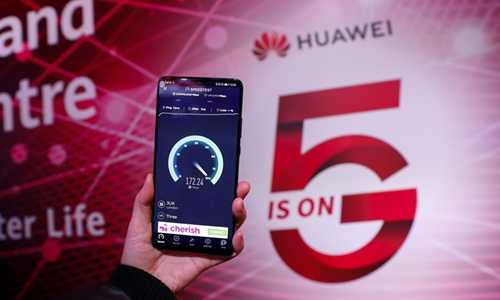COMMENTS / EXPERT ASSESSMENT
Western world's auction of 5G spectrum will cost consumers, telecoms, slow national development

5G Illustration: VCG
The US Federal Communications Commission on Friday (US time) announced the closing of the first phase of C-Band auction, that produced gross proceeds in excess of $80.9 billion, a record high. Bidders will also need pay $9.7 billion in incentive payments to accelerate the freeing up of spectrum in the key C-band by shifting existing satellite users. US-based Verizon and AT&T are expected to be the winners in the auction.
It's not the only high-priced auction. Four bidders, including O2, Vodafone, EE, and Three, spent 1.35 billion pounds for 5G spectrum auction in the UK in 2018, and the second phase auction is scheduled to be held soon. The UK authority rejected calls from operators who have lobbied for a distribution plan rather than a traditional auction, requiring UK telecoms carriers to pay heavily for the spectrum.
It seems that this is only an approach to allocate 5G spectrum, but in fact it is a country's strategic choice in infrastructure construction.
When carrying out large-scale infrastructure construction, it is a fundamental choice to use it as a cash cow or regard it as a cornerstone in the country's long-term development to rapidly and efficiently setup the network and boosting informationization.
China has chosen to allocate spectrum according to the requirements and capabilities of telecom carriers instead of charging a great amount of spectrum occupation fee, which enables the operators to carry out large-scale network construction.
The government's requirement to accelerate network speed, lower fees and provide universal access to every village has promoted telecom operators to extend their networks to every corner of society, as consumers enjoy services at a lower cost.
Among the world's major economies, China has the world's best coverage in both fiber optics and 4G networks, with 4G base stations accounting for 65 percent of the world's total, facilitating the successful development of mobile internet, with food delivery, navigation, car sharing, bike sharing, mobile payment, and other services reaching all of society. Mobile Internet services have not only boosted the development of China, but also extended its momentum overseas, with many well-known industry leaders such as WeChat, Alipay and TikTok.
As in the 4G era, China leads the world in the development of mobile Internet through its strong network support and low service prices, China's 5G generation will be a strong network that will integrate artificial intelligence, intelligent sensing, big data and mobile Internet to greatly enhance social management, industrial manufacturing and social activities. It will serve as the basic competence of a country's high-speed development, and the basic force to shore up its national strength.
Since the 3G era, the Western world has been taking the telecom network construction as a cash cow, and charging telecom operators sky-high fee in spectrum auctions, rather than regarding it as a driving force for social and economic development. The latest auction in the US requires operators to pay over $90 billion for spectrum usage before they even initiation network construction, which is nearly the same amount China's telecom operators spent during two years of actual network construction.
Under such circumstances, one possible result is that the carries will price their services too high to be affordable for users, while the carriers may eventually give up the construction in remote areas due to difficulties in recouping costs. Whether local residents need it or not will no longer be an issue that telecom operations will care about.
Essentially, the spectrum auction is a strategic choice of a country, which will affect the development of a country's infrastructure and even its national strength in the long run. European countries and the US, in the past two decades, have gradually lost their leading position in the realm of information and communication, as well as their ability to operate efficiently. One of the reasons is that they have chosen to use basic industry as a tool to collect money, and has taken away the firewood under the cooking pot, however, the approach seems unchangeable, because it is determined by a country's social system and management philosophy.
The article was compiled based on a commentary written by Xiang Ligang, director-general of the Beijing-based Information Consumption Alliance. bizopinion@globaltimes.com.cn



